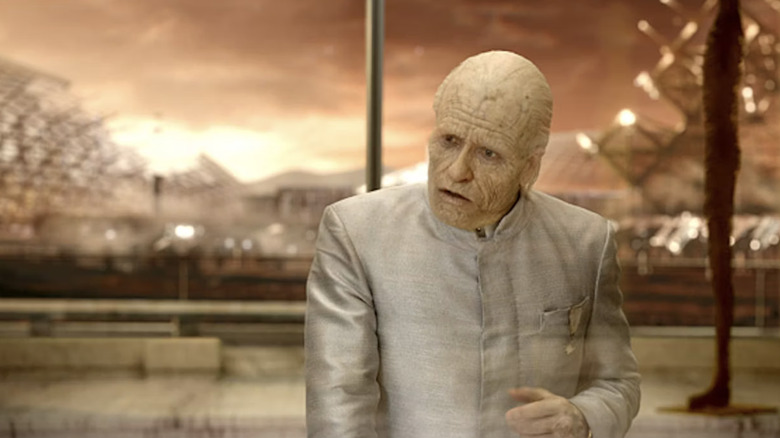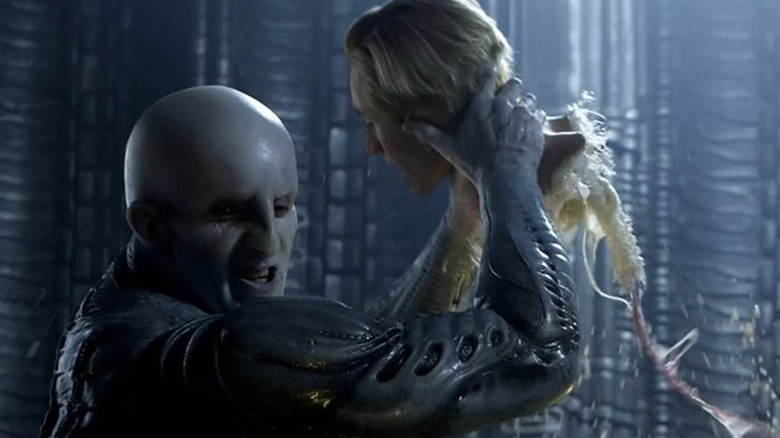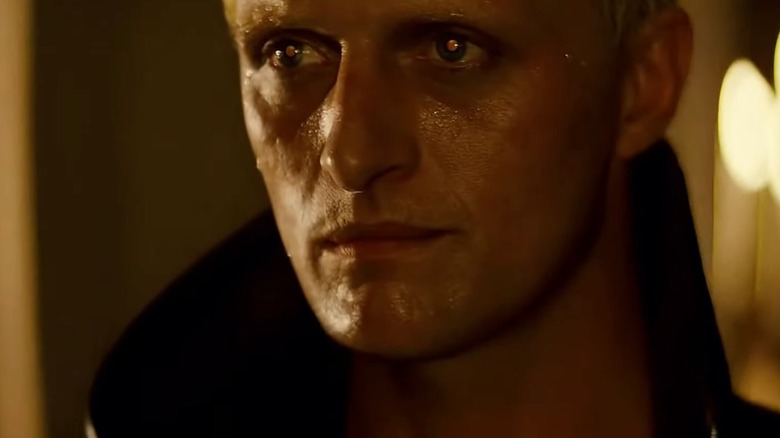Prometheus Deleted Scenes Explain The Movie's Most Shocking Sequence
Ridley Scott's 2012 "Alien" prequel "Prometheus" has been criticized for its vague lore and screenplay that wraps mysteries inside enigmas. I'm a fan of the picture — and Scott's 2017 sequel "Alien: Covenant" — but I will concede I remain frustrated that the movies didn't dig deeper into the alien Engineers. These ancient and inscrutable beings created us in their image, "Prometheus" reveals with its opening scene, yet now they want to destroy us. The movie doesn't answer why. Did the Engineers always intend humans as Xenomorph breeding stock? Did our ancestors fail their parents (perhaps by killing one of their emissaries)?
"Prometheus" ends with Dr. Elizabeth Shaw (Noomi Rapace) and android David (Michael Fassbender) flying off to the Engineers' homeworld, intent on getting answers. "Covenant" doesn't give them, for David wiped out the Engineers with their own bio-weapons and then killed Shaw. Just like the main characters of "Prometheus," I keep wrestling with the question of why a creator would kill their creation, forever denied a clear answer.
Scott has not assembled a full-on director's cut of "Prometheus," but some deleted scenes have been released. One fills in gaps of an existing sequence in the theatrical cut — when David's elderly creator Peter Weyland (Guy Pearce) awakens the last surviving Engineer and asks that it cure him of death.
Here's how the scene unfolds in the theatrical cut: David tells his human companions that 2000 years ago, the Engineers had been planning to go to Earth and wipe it out with their black goo bombers. David wakes up the Engineer and Dr. Shaw interjects, asking why his people hate humanity. Weyland has his goons knock Shaw down and, through David, makes his request. The Engineer strokes David's head before tearing it off, killing the entire search party bar Shaw, and restarting plans for the annihilation of Earth.
The longer version of the scene (see below) makes the Engineer's violent turn less sudden, with some additional clues about the themes of "Prometheus."
Prometheus deleted scenes show the Engineer speaking
So, the big differences in this "restored" version of the scene are twofold. David introduces himself and Weyland to the Engineer. In this cut, the Engineer responds, apparently asking why they came. Cue Shaw interjecting and being silenced as in the theatrical cut. Then, after David makes his request to the Engineer, the alien angrily asks why Weyland wants to live forever. Cue Weyland laying bare his god complex, saying he is akin to the Engineers as he created David like they created humans. "Gods never die," Weyland claims. It's unclear how much the Engineer understands him but in this cut, Weyland's words are the last straw in setting the Engineer off.
The flow of the scene is improved by these additions and more context brings more clues, but even in the longer cut, you're left inferring the Engineers' motives.
Adding to the mystery is how the Engineer and David speak in unsubtitled/untranslated Proto Indo-European. (In the world of "Prometheus," this ancient language is the native tongue of the Engineers, which they passed onto us when they visited primordial Earth.) The film's linguistic consultant, Dr. Anil Biltoo, was able to shed some light when asked. Here's a good enough approximation of David's line to the Engineer: "This man is here because he does not want to die. He believes you can give him more life."
"More life." That's a very specific phrase that sheds light on Scott's intention with this scene.
The answers to Prometheus lie in Blade Runner
Many critics have noted that "Prometheus" and "Covenant" feel like Scott trying to harmonize his two science-fiction masterpieces, "Alien" and "Blade Runner," into one story. In the latter, the replicant (organic android) Roy Batty (Rutger Hauer) is programmed to live a mere four years. He seeks out his creator, Dr. Eldon Tyrell (Joe Turkel), and demands: "I want more life... father." (Or "f**ker" depending on the cut.) When Tyrell can't solve this problem, Batty crushes his head.
In "Prometheus," Scott is recreating this moment and flipping it; an arrogant man, desperate not to die, demands his creator save him. Only in "Prometheus," humans are the created, not the creators. The parallels go back earlier in the film, especially when David is chatting with Dr. Charles Holloway (Logan Marshall-Green). Holloway wants to know why the Engineers created humans, so David asks why humans made an android like him. "We made you cause we could," Holloway flippantly answers, and David asks him to imagine what a disappointing answer that would be.
The horror of "Prometheus" is that we were created by a greater force, but that force is not a God of endless love who raised us above all other life. No, our creators look at us the same way we'd look at robots — as half-formed facsimiles of true life. Now that's scary.


